This article first appeared in The Alt on January 30, 2017.
“Are you fucking kidding me?”
Taina Asili is in shock. In the few weeks I’ve been covering her, I’ve never seen her like this, utterly caught off guard. I wouldn’t call Taina Asili a reserved person — but whatever little reserve she normally keeps to herself is gone, right now.
“Yeah,” I say, nodding sympathetically. “I just found out. Trump’s going to eliminate the entire National Endowment for the Arts.”
“Oh my god,” says Taina. And then, she shakes her head. “I can’t focus on that right now,” she says. “Too much is happening right now.” she says, shaking her head, as if to banish the thought.
We are backstage at the Rock and Roll Hotel in Washington, D.C., waiting for the show to begin, loading up on backstage snacks. Taina is playing the Disrupt J20 show; her band is an opening act for Jeff Rosenstock and Immortal Technique. All proceeds are going to the Diverse City Fund, an organization in D.C. that makes grants to woman and person-of-color-led organizations. Almost every performer tonight will sing about social justice issues; will decry the system of mass incarceration, or will sing for justice for refugees and immigrants. Taina is no exception.
We go downstairs, sufficiently fortified by free food. Evan Greer plays a set, and then it’s time for Taina Asili y La Banda Rebelde to rock the stage, and rock they do. I know, from watching Taina rehearse the week prior, that the band’s music is complex, with many different elements woven from different cultural inspirations—and somehow, I forget that this much thought has gone into making Taina’s music what it is. (When asked what genre she plays in, Taina smiles and says “social justice!”) I wonder that a voice as strong and sure as Taina’s can exist, I wonder at my luck at having been able to experience Taina’s sound as many times as I have. Pure feeling takes over me, and I am swept away. Leaving behind journalistic integrity, I dance like a mad woman, kicking my feet out as the band speeds up, changes up the tempo.
On the other side of Taina’s work; I’ve been fortunate enough to be witness to the rehearsal process, to be let into the songwriting process. I got to see how to make what is hard sound simple. “I’m always thinking about the rhythm,” she tells me. “It’s the heartbeat of a song.” The songwriting happens in layers. Gaetano Vaccaro (Taina’s partner in life and the band guitarist) and Taina root the song in melody, and then, with the help of drummer Kiki Vassilakis and bassist Gabby Canzeri, will search for the rhythms that will make the music come alive. They might reach for a Haitian meringue or a classic reggae beat; they will almost certainly switch the rhythms up several times in one song. “We like to challenge ourselves with new rhythms and chord progressions,” Taina says. And challenge they do. Many of the Latin rhythms they use rely on conga drums, which can be a struggle to translate to the traditional drumkit. It’s a particular challenge for Kiki, who comes out of the Greek tradition, known for its upbeat, fast tempo, to adapt to new styles of percussion. “It’s a lot more complicated than it looks,” says Taina, laughing.
The songwriting process continues in layers. Next come the horns, then come the vocals. Taina tells me that the band used to jam out during hours-long rehearsals to figure out a song—but that happens less now. Everyone’s busy.
The most recent expression of Taina’s work is with La Banda Rebelde, where she layers her powerful, defiant vocals over Afro-Caribbean, Latin, and reggae beats. But the music Taina first gained fame with was nothing like the tradition she is with now.
“When I was 16, I joined a punk band called Anti-Product,” Taina says. “That band became really popular in the punk scene. I was in it for about eight years.” Listening to Anti-Product’s earlier records now, you hear a very different Taina; her voice younger and thinner than it is now, but still commanding a presence, still demanding to be heard. Anti-Product’s lyrics focused on the same themes of resistance to the capitalist, imperialist, racist machine that Taina focuses on now.
“It was my introduction to the political realm, in a certain way,” Taina says. Her father, a Latin jazz band director, was influenced by the Young Lords and the Black Panthers, and was a particular adherent of Malcolm X. Her parents politicized Taina from a young age, but punk was Taina’s opportunity to explore these politics for herself for the first time; to make them her own. “I moved into issues like political prisoner support, animal rights, and environmentalism—what I’d now call climate justice.”
In the early 2000s, the group moved from Binghamton to Philadelphia, where Taina was immersed in a sea of artistic creativity and vision. “We had staples like Amiri Baraka and Sonia Sanchez, we had my contemporaries like Ursula Rucker and other artists who were less known but were huge influences, particularly in the world of poetry.”
Punk rock was a natural home for Taina politically, but slightly unusual stylistically. At home, Taina sang and played in the bomba tradition of Puerto Rico, but she was also a trained opera singer. Hip hop and R&B were also big influences for Taina. “As I started to grow older, I started to feel really limited in the punk scene, in terms of the politics and the music,” she tells me. Anti-Product, already unique for featuring a djembe player, a cellist, and a woman of color lead singer, grew more unique as Taina started incorporating spoken word and poetry into her music.
In 2002, when Anti-Product disbanded, Taina started doing spoken word professionally. In 2005, Taina received the Leeway Foundation Transformation Award, a $15,000 grant which allowed her to produce and release her first album apart from Anti-Product, titled War Cry. War Cry enabled Taina to bring together her punk roots and her poetry and her Puerto Rican and contemporary influences — the reggae and hip hop that she loved so much.

In the meanwhile, life marched on, in sometimes painful ways. Taina’s mother died, and her father was diagnosed with cancer and soon died afterwards—she moved back to Upstate New York to be with her family. “In many ways, War Cry was a mourning,” she says. “I had lost my father and I had moved out of my community of Philadelphia.”
But things weren’t all bad. “I had a child; my son was born. I had this whole new perspective on life.” She also met her songwriting partner and “the love of her life”, Gaetano Vaccaro, during this time. “We just really clicked musically in a way I hadn’t with anyone since I was a child, playing with my sister and father. We started to write songs in here in Albany and started to meet musicians in the area.”
I ask Taina about what it’s like being in Albany, after so many years of living and making music in Philadelphia. She admits that it can be a little limiting to be in such a small city — that sometimes she wishes there were more venues to play. But the presence of so many strong social justice institutions and organizations makes up for the other things that Albany lacks, musically.
“What Albany offers me is constant food for my work,” Taina says, thoughtfully. “When I moved here, there were all these great people and institutions doing this important work. She cites Barbara Smith, one of the founders of Black Feminism, who lives in Albany. She also lists Carmen Rau and Naomi Jaffe, of Holding Our Own. “There’s was the Social Justice Center, and the Pride Center, and In Our Own Voices. And now there’s YouthFX and Soul Fire Farm. They give me constant inspiration for my work.”
What is Taina working on now?
“I’m working on a project called Resilience, where I interview five women of color in my community about resilience,” Taina tells me. “We are doing a great job of telling our stories on social media, but we are constantly fed these stories of how we are suffering through injustice, instead of the ways in which we are surviving and moving through injustice and suffering.”
Taina considers it one of her responsibilities to add to a more balanced portrayal of women of color and people of color. “We’ve only been awakened to one side of the truth,” she says. “Destructive systems did not pop up out of nowhere, they’ve always been with us. That’s true and is important for us to know. But we’ve been surviving and thriving just as long as those systems have existed. With this pain comes a legacy of resistance and resilience. We need to know that and reflect that in all kinds of ways including and especially in art.”
Taina played at the Women’s March on Washington, sharing a stage with Angela Davis, Janelle Monae, and Madonna. Her sound has reached millions across the country watching on livestream and across the world. She is be a striking ambassador for Albany, spreading her fierce message of resilience to the rest of the country. Taina lit up the crowd of thousands the way few musicians who played that day really are capable of.
But the performance that really moves me isn’t in Washington; it isn’t broadcast to millions, it isn’t on a stage, even — it’s next to the Delta check-in desk. We are in the Albany airport the day after President Trump has moved to restrict the movement of all immigrants from seven Muslim countries, as we are gathered to protest the latest executive action. Taina will take the megaphone, entering the space in the middle of the crowd that has cleared for speakers to say their piece. Taina will helpfully, lovingly, reminds the mostly-white crowd that has gathered that not all Americans started out as immigrants from another country—and that not all immigrants to this country came of their own volition. She talks about what it will take to mount a resistance to the Trump regime; she talks about the resilience that will be required from activists in the months and years going forward. She sings a song of defiance — her voice is badly distorted by the megaphone, but she sings nonetheless.
If we have leaders like Taina Asili going forward, gathering the resistance won’t be hard.
photo credits: top of story, Kiki Vassilakis; middle of story, Thom Williams

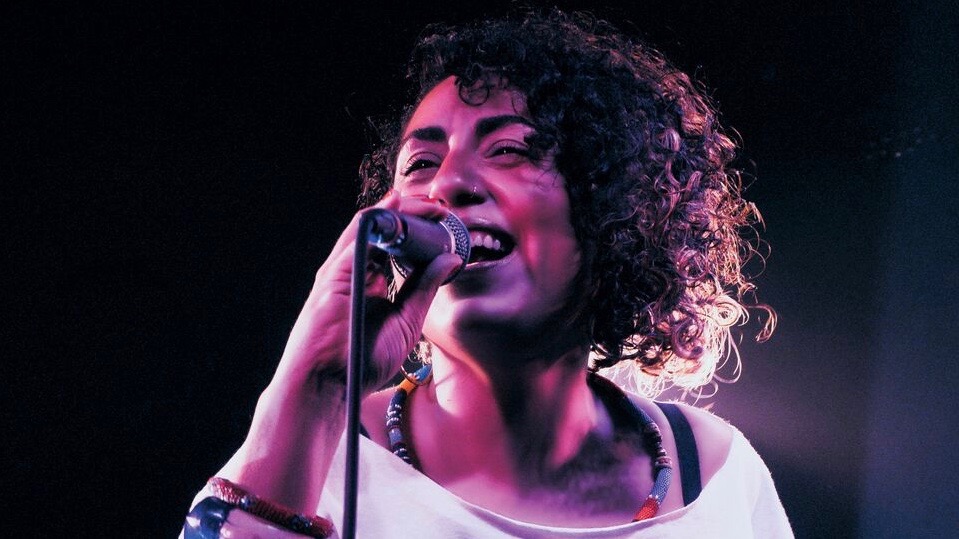
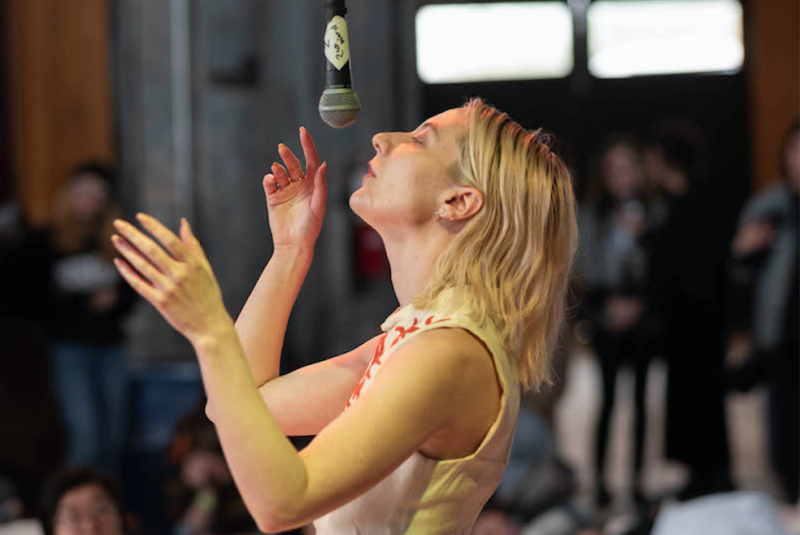
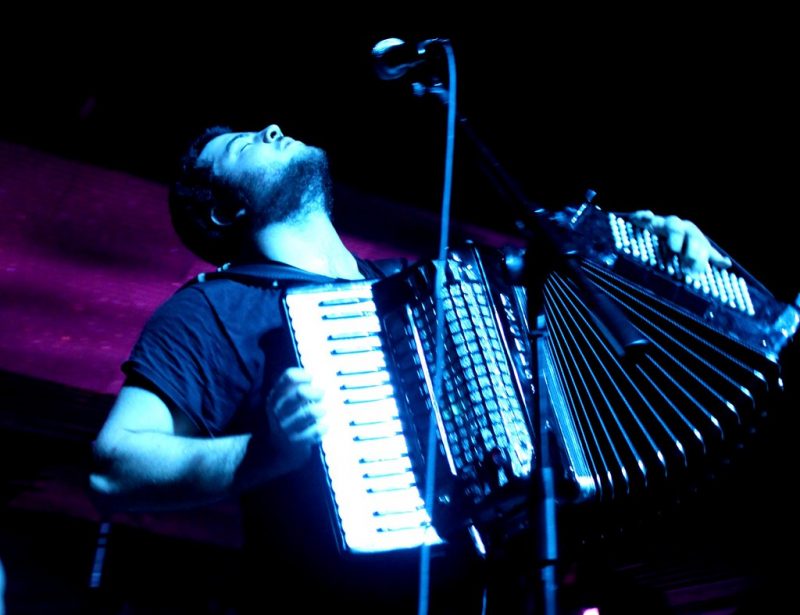
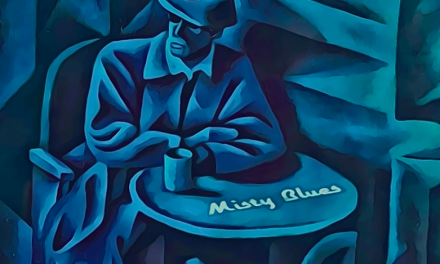
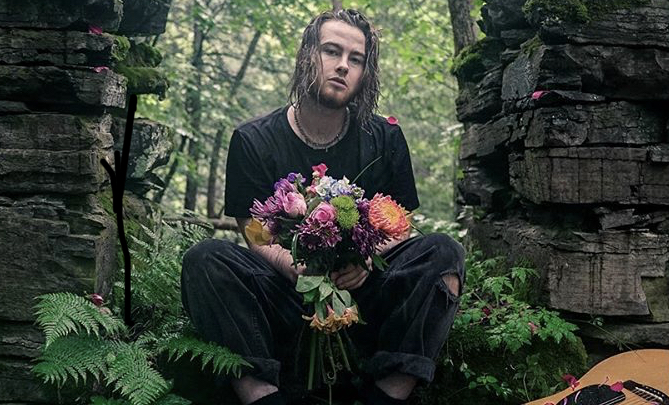
Trackbacks/Pingbacks